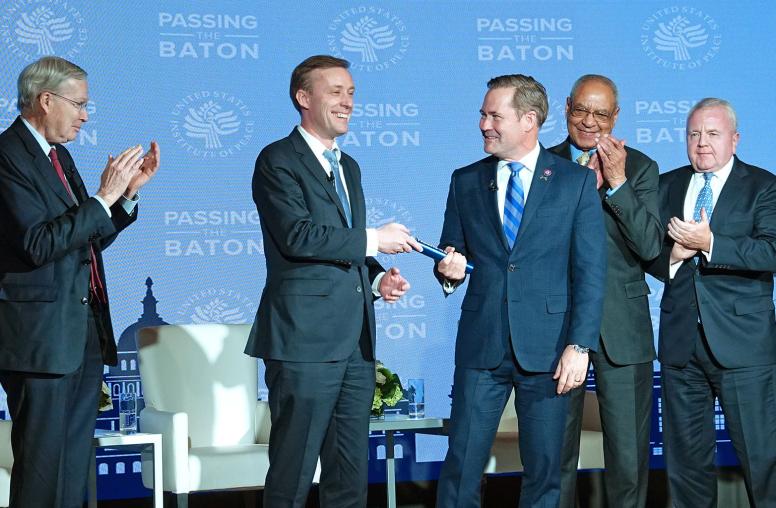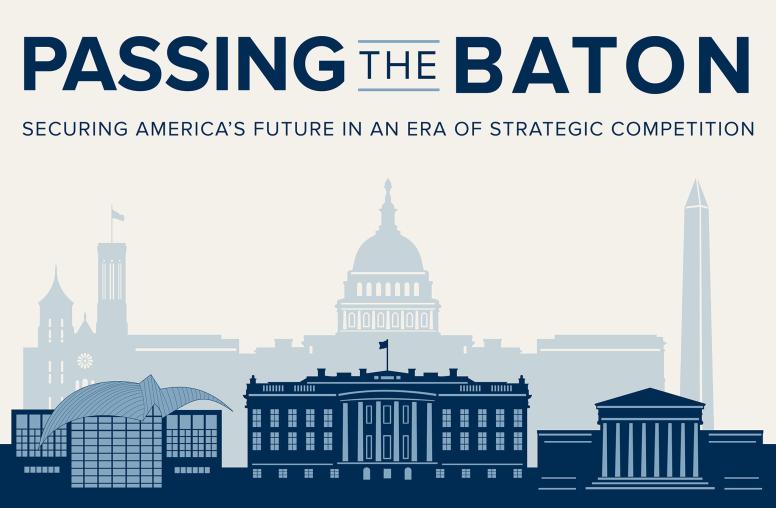Challenges for the Future of U.S. Human Rights Policy
An Institute Newsbyte explores highlights from a recent address by Assistant Secretary of State for Democracy, Human Rights, and Labor Harold Hongju Ko.
What lessons can be learned from the Clinton administration's experience with international human rights issues? In a special session hosted by the United States Institute of Peace, then Assistant Secretary of State for Democracy, Human Rights, and Labor Harold Hongju Koh discussed some of the lessons learned and challenges ahead for promoting democracy and human rights for U.S. foreign policymakers.
The points below are major themes and highlights from Koh's presentation. An archived copy of the audio of the entire session can be found on the Institute's website.
Creating a Solid Foundation for U.S. Human Rights Policy
Koh stressed during his presentation that human rights policy priorities are not determined by a fixed agenda so much as they are guided by a consistent set of principles. To create a stable American human rights policy, the Clinton administration employed the following five core strategies to promote democracy abroad:
1. Raising global consciousness about the benefits of democratic governance -- especially through the administration's Community of Democracies Initiative.
2. Establishing the viewpoint that democracy and democratic governance is a human right.
3. Identifying countries that the U.S. government deems to be "democracy-priority" countries into which the United States will unilaterally shift a higher degree of diplomatic support and assistance, such as Colombia, Nigeria, Indonesia, and Ukraine. Although these nations are unstable, they would be in worse shape if they did not have the support of the U.S. government.
4. Developing strategies to combat democratic backsliding in countries such as Haiti, Peru, Pakistan, Fiji, and Cote d'Ivoire.
5. Using U.S. democratic assistance resources to help build rule of law institutions in countries where they are weak. The overall objective is an integrated democracy-promotion program in which the work of private sector organizations and public diplomacy efforts are coordinated to give greater impact to their separate efforts.
Challenges for the Next Administration
Koh also pointed out that achieving an effective human rights policy that is integrated with other policy priorities of the U.S. government proved to be a severe challenge because of the following six constraints:
1. Crafting human rights policy is a complex job. The government's human rights mandate, which in the late 1970s and early 1980s focused primarily on reporting, now includes multilateral diplomacy, democracy promotion and coordination, promotion of religious freedom, labor rights, asylum cases, and domestic compliance with human rights norms.
2. Human rights policy must be implemented within the structure of an unwieldy bureaucracy and interagency policy process. The majority of time in the Bureau for Democracy, Human Rights and Labor is spent on coordinating with other agencies within the U.S. government.
3. There are few resources devoted to the Bureau of Democracy, Human Rights, and Labor. A small staff, no matter how competent, cannot easily gain leverage within the bureaucracy without sufficient human and financial resources.
4. There is a wide range of interlocutors with whom to coordinate activities and achieve common objectives. Dealing with officials in Congress, the media, non-governmental organizations (NGOs), and other U.S. and international government agencies places a high physical burden on staff. The challenge of "being everywhere" at the same time strains the resources of the Bureau.
5. There is a strong sense that the United States ought to be engaged on human rights and democracy issues everywhere in the world, but there is not much concern about whether it has the resources to do it. Such ambitious expectations are not in sync with the resources allocated to work on these issues.
6. Officials have little time to think about human rights policy. Strategizing, developing, and maintaining a sustainable vision of human rights implementation in the short time one holds an influential position is a significant policy constraint.
The Road Ahead...
In light of the challenges facing the next administration on international human rights issues, Koh offered the following advice.
- Always tell the truth in monitoring, reporting, and advocacy
The core value that should be pursued is that the human rights reporting should be accurate and authoritative. This is not a partisan issue. The commitment must be to telling the truth about human rights conditions - which requires synthesizing partial and often conflicting information.
- Accountability for past abuses must be consistent with the needs of reconciliation and transition.
The concepts of accountability and truth telling are closely related. Specifically, the United States has tried to promote accountability in Kosovo, Bosnia, Rwanda, Cambodia, Indonesia, Sierra Leone, Chad, El Salvador, Guatemala, and Chile; to support the work of War Crimes Tribunals in Yugoslavia and Rwanda; and to support the Bosnia human rights mechanisms and the UN High Commissioner for Refugees.
- Always seek principled, purposeful engagement with regard to ongoing abuses
The United States has applied the "inside/outside" approach to challenging ongoing human rights abuses. This has been a strategy of principled, purposeful engagement with allies as well as adversaries, and is formalized in the form of bilateral human rights dialogue; daily engagement; tailored sanctions; democracy assistance programs; regular reviews of arms transfers and security assistance; certification of countries human rights records; and pressing on a day-to-day basis the release of political prisoners.
- Work proactively to prevent future abuses
Human rights work is a pathological exercise dealing with the fallout of defective political and social systems. Mechanisms used to alleviate current and future abuses are preventive diplomacy, promoting democracy, and building public and private partnerships. For each of these outcomes, the United States
has tried to put into place initiatives that work toward abuse-prevention policies of diplomacy backed by force, and sometimes force backed by diplomacy; building atrocities-prevention networks that focus on looming hotspots such as Burundi and the Moloccas; and information-sharing and standard setting activities are all part of the toolkit of preventive diplomacy.
- Endeavor whenever possible to build transnational partners
In the interest of preventing future abuses, it is critical for the United States to develop transnational partnerships. The U.S. government recognizes that democracy and human rights issues are ones in which there is a community of concern and the need to keep that community mobilized. With respect to the new economy, the U.S. government has tried to promote partnerships of Internet companies, service providers, and technology providers to promote human rights. In the area of international labor, the U.S. government supports initiatives on shutting down sweatshops by finding common ground between Congress, NGOs, labor unions, and corporate entities. The United States promotes the notion that governments are not the only players, and continues to work with NGOs and other concerned groups to achieve adherence to human rights standards.
In closing, Koh stressed that it is imperative that a sustained, institutionalized bipartisan commitment to human rights must be developed by the United States. Human rights and democracy are not partisan issues that will change according to those holding power. The U.S. government should implement in a bipartisan way not just good governance and the rule of law, but child labor issues, democracy promotion issues, and atrocities prevention. Human rights and democracy must be institutionalized as bipartisan values.
About the United States Institute of Peace
The United States Institute of Peace was established by Congress in 1984 as a result of a decades-long public campaign to create a national peace academy. An independent, nonpartisan, and federally funded institution, the Institute works to strengthen America's national capabilities for managing and resolving international conflicts by peaceful means. Through its education, research, training, and other programs, the Institute endeavors to provide a resource base for policymakers, researchers, and the public to address the challenges to peacemaking and stability that confront our country and the international community in the post-Cold War world.
The Institute is governed in its efforts by a bipartisan board of directors appointed by the President of the United States and confirmed by the Senate. The board is comprised of fifteen voting members. Twelve members are appointed from the private sector, and three senior executive branch officials serve ex officio - the Secretaries of State and Defense, and the President of the National Defense University.
About the U.S. Institute of Peace's Human Rights Implementation Project
In March 1999, the U.S. Institute of Peace launched a new initiative on Human Rights Implementation by holding the first in a series of working group discussions on "Promoting Human Rights in the Pursuit of Peace: Assessing 20 Years of U.S. Human Rights Policy." Human rights considerations have played a significant role in the United States' approach to international affairs over the past two decades. Despite the increasing emphasis on human rights issues in foreign policy formulation, there has been little effort to evaluate how U.S. human rights policies and practices have affected human rights observance in the rest of the world. Nor has an assessment been given to past or existing policies to determine their efficacy.
The objective of the Human Rights Implementation project is to critically examine human rights policies implemented by the U.S. government in order to identify ways upon which these policies might be improved. Have past or existing policies been effective? If so, why or why not? What tools were used in implementing these policies, and why? Were the policies that were implemented effective in achieving stated objectives? The Human Rights Implementation project is working to assess the reasons for successes and failures in U.S. human rights policy in order to provide insight into improved future policies.
The United States Institute of Peace is an independent, nonpartisan federal institution created by Congress to promote research, education, and training on the peaceful management and resolution of international conflicts. Established in 1984, the Institute meets its congressional mandate through an array of programs, including research grants, fellowships, professional training, education programs from high school through graduate school, conferences and workshops, library services, and publications. The Institute's Board of Directors is appointed by the President of the United States and confirmed by the Senate.
Chairman of the Board: Chester A. Crocker
Vice Chairman: Seymour Martin Lipset
President: Richard H. Solomon
Executive Vice President: Harriet Hentges
Vice President: Charles Nelson



